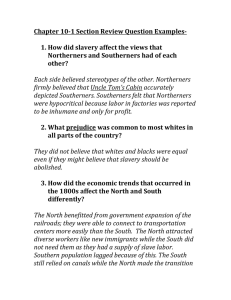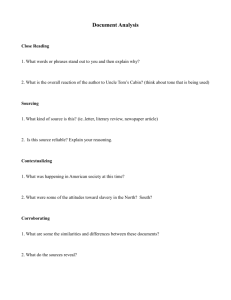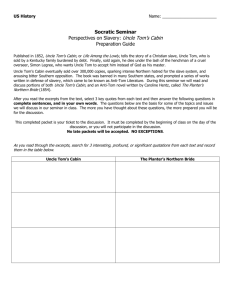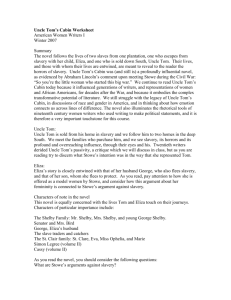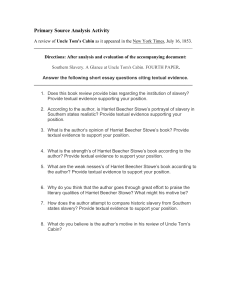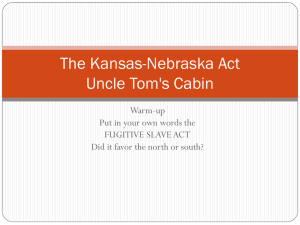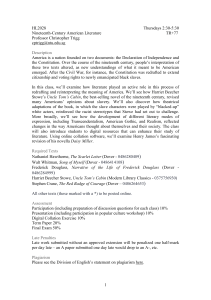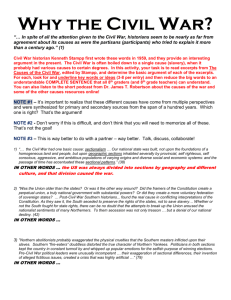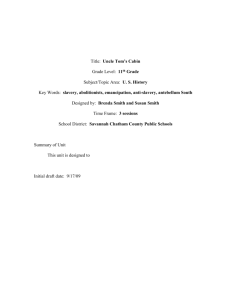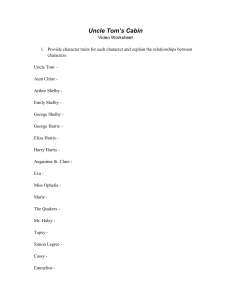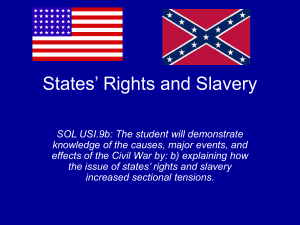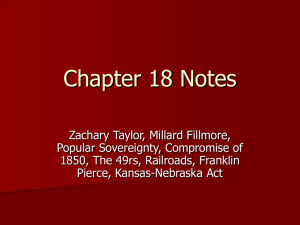Chapter 10 Section 1 Notes
advertisement
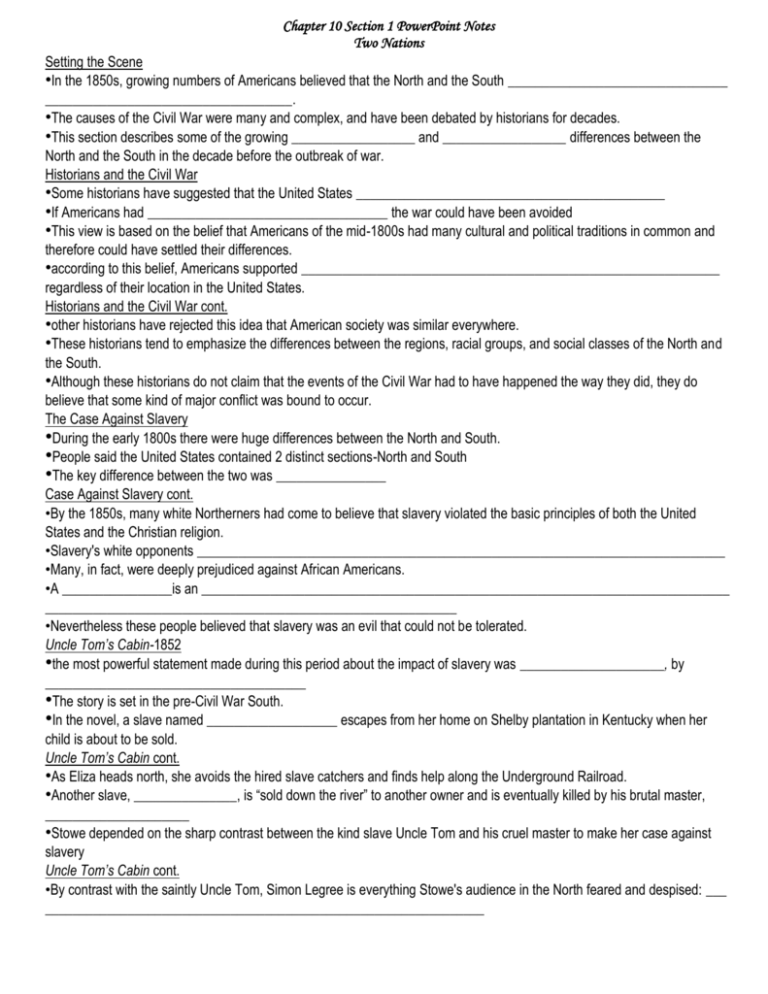
Chapter 10 Section 1 PowerPoint Notes Two Nations Setting the Scene •In the 1850s, growing numbers of Americans believed that the North and the South ________________________________ ____________________________________. •The causes of the Civil War were many and complex, and have been debated by historians for decades. •This section describes some of the growing __________________ and __________________ differences between the North and the South in the decade before the outbreak of war. Historians and the Civil War •Some historians have suggested that the United States _____________________________________________ •If Americans had ___________________________________ the war could have been avoided •This view is based on the belief that Americans of the mid-1800s had many cultural and political traditions in common and therefore could have settled their differences. •according to this belief, Americans supported _____________________________________________________________ regardless of their location in the United States. Historians and the Civil War cont. •other historians have rejected this idea that American society was similar everywhere. •These historians tend to emphasize the differences between the regions, racial groups, and social classes of the North and the South. •Although these historians do not claim that the events of the Civil War had to have happened the way they did, they do believe that some kind of major conflict was bound to occur. The Case Against Slavery •During the early 1800s there were huge differences between the North and South. •People said the United States contained 2 distinct sections-North and South •The key difference between the two was ________________ Case Against Slavery cont. •By the 1850s, many white Northerners had come to believe that slavery violated the basic principles of both the United States and the Christian religion. •Slavery's white opponents _____________________________________________________________________________ •Many, in fact, were deeply prejudiced against African Americans. •A ________________is an _____________________________________________________________________________ ____________________________________________________________ •Nevertheless these people believed that slavery was an evil that could not be tolerated. Uncle Tom’s Cabin-1852 •the most powerful statement made during this period about the impact of slavery was _____________________, by ______________________________________ •The story is set in the pre-Civil War South. •In the novel, a slave named ___________________ escapes from her home on Shelby plantation in Kentucky when her child is about to be sold. Uncle Tom’s Cabin cont. •As Eliza heads north, she avoids the hired slave catchers and finds help along the Underground Railroad. •Another slave, _______________, is “sold down the river” to another owner and is eventually killed by his brutal master, _____________________ •Stowe depended on the sharp contrast between the kind slave Uncle Tom and his cruel master to make her case against slavery Uncle Tom’s Cabin cont. •By contrast with the saintly Uncle Tom, Simon Legree is everything Stowe's audience in the North feared and despised: ___ ________________________________________________________________ •Not only does he _____________________________________ of his plantation, but in the end he beats Uncle Tom to death with a whip. •In the story Stowe made Legree a Northerner who had moved to the South. •She wanted to show that slavery also could corrupt those born outside the system. Uncle Tom’s Cabin cont. •Stowe also wrote powerful scenes in which northern ________________________________________________________. •For example, in one scene set in a house in Ohio, a wife persuades her husband, a senator, to permit some escaped slaves to continue their journey to Canada. •When her husband tries to argue with her, she replies: •“I don't know anything about politics, but I can read my Bible; and there I see that I must feed the hungry, clothe the naked, and comfort the desolate; and that Bible I mean to follow.” Impact of Uncle Tom’s Cabin •Uncle Tom's Cabin had as powerful an effect in Stowe's time as _______________________________________ had in his •Stowe's novel presented a vivid picture of slavery in the South that northern readers found believable, even if it was in fact exaggerated. •As they read Uncle Tom's Cabin, many Northerners became convinced that slavery would be the ruin of the United States. •They worried about the impact of slavery not just on African Americans, but on whites and American society in general. •Of this they were sure: they would never allow the United States to become a land of Simon Legrees. Southern Views of Society •Southern intellectuals and politicians reacted very differently to Uncle Tom's Cabin. •To them, Stowe's bestseller was a book of ________________________. •While they admitted that some masters did treat enslaved people badly, they argued that few were as cruel as Simon Legree. •Some white Southerners claimed their households were like ____________________________________ Southern Views of Slavery cont. •They claimed that most planters took a __________________________ in the well-being of the enslaved people who worked for them and provided them with the basic necessities of life. •Northern industrialists, they argued, took no personal responsibility for their workers because they had no strong connection to them. •Northerners could ______________________________________ and therefore, Southerners believed, northern employers did not care if they paid workers enough to buy decent food, clothing, and shelter. •Most Southerners believed that northern business owners mistreated their workers because they were motivated solely by profit. Cannibals All •The most direct statement of this point of view appeared in a book by George Fitzhugh published in 1857, titled __________ __________________________ •Attacking northern industrialists, whom he saw as no better than cannibals Southerners Represent the True Spirit of the American Revolution •Many white Southerners argued that they represented the true spirit of the _____________________________ •George Washington, Thomas Jefferson, and many other Revolutionary leaders ______________________________ •These Southerners believed that their households possessed an order, a grace, and a sense of liberty that Northerners could not begin to understand. •On one point almost all Southerners agreed: they were not about to let Northerners, whom they saw as arrogant and selfrighteous, tell them how to live. Differences between the North and South •Each year the North was becoming ever more ___________________________________ than the South. •Its population, already more than twice as large as the South's, was becoming even larger and more diverse as Irish and German immigrants crowded into northern cities. •By 1860, nine of the country's ten largest cities were located in the North.
